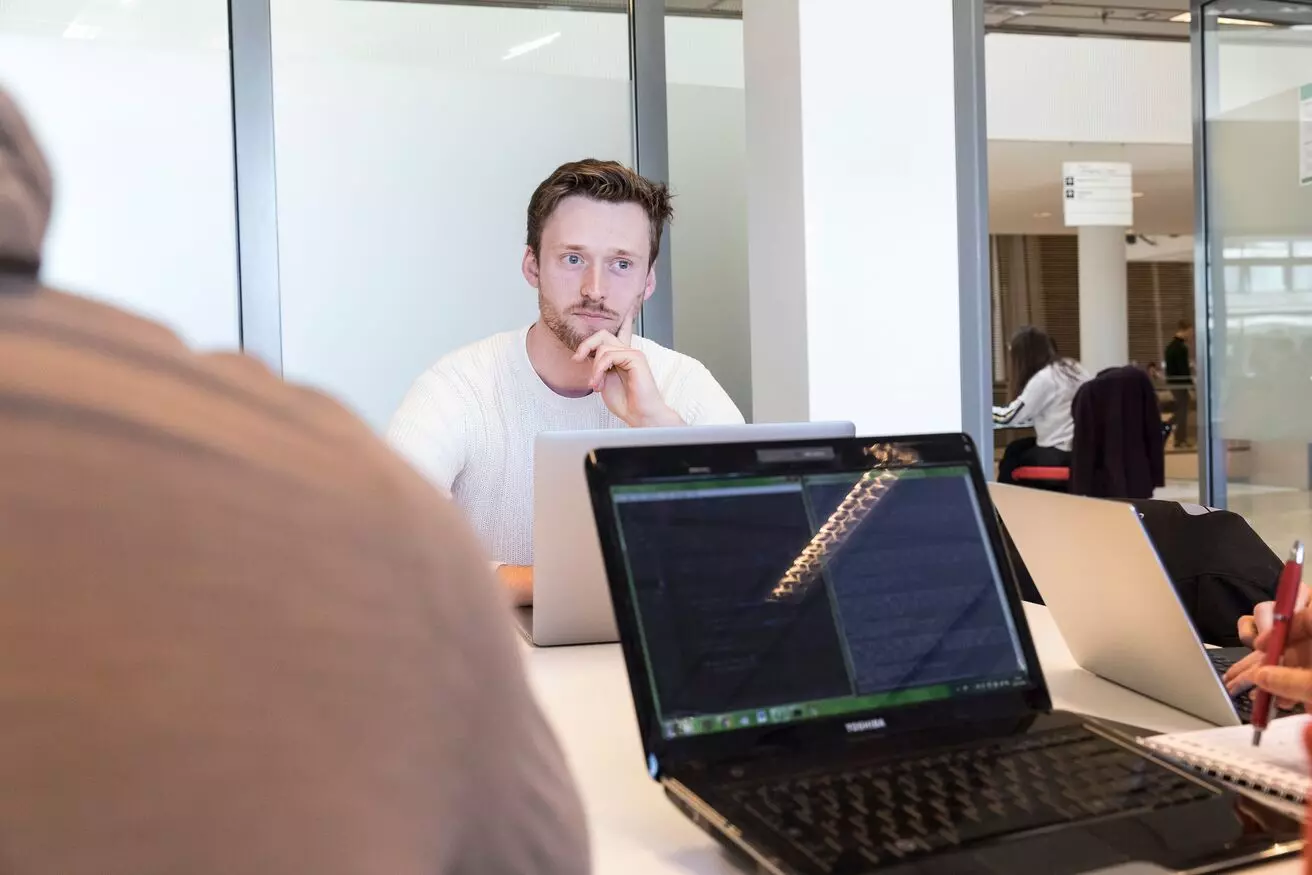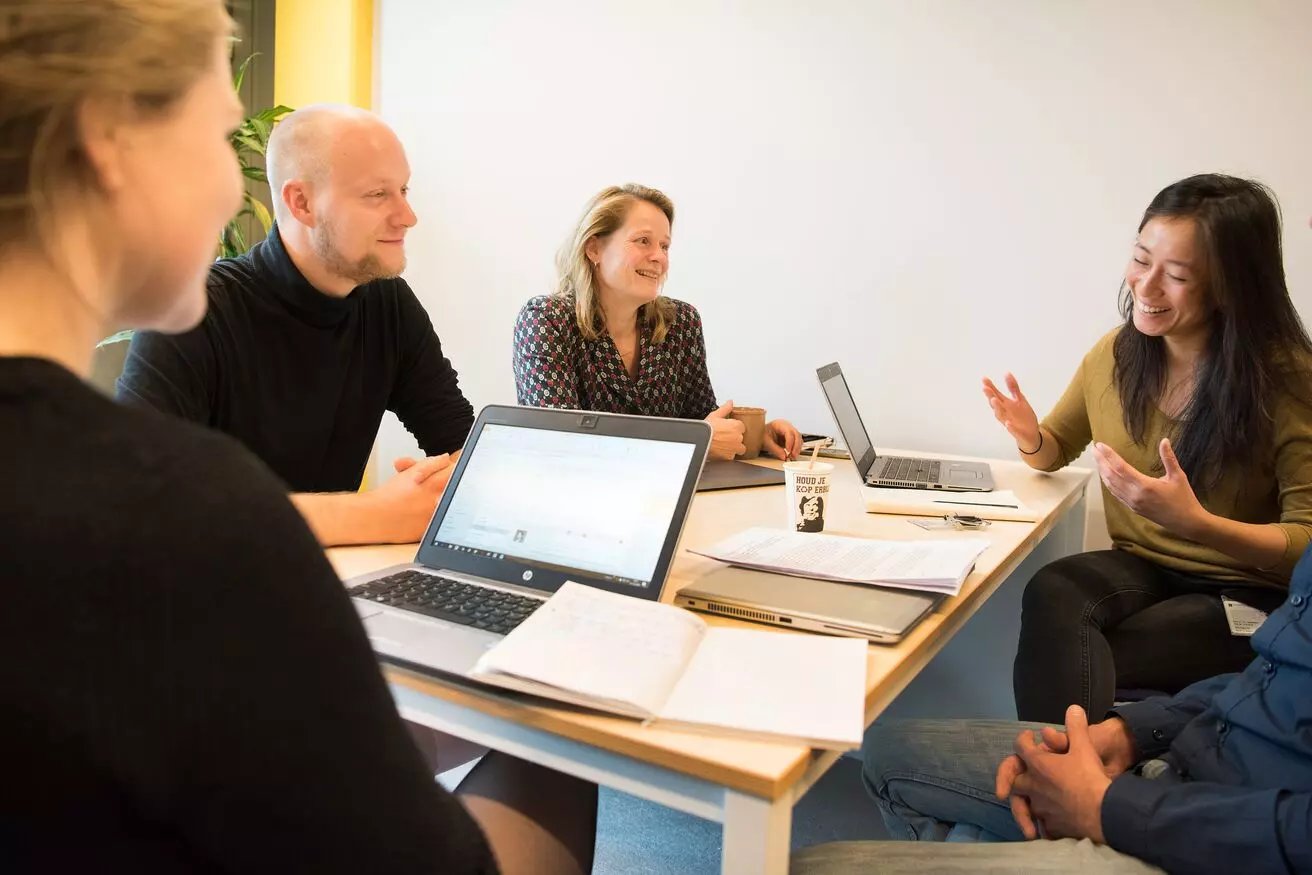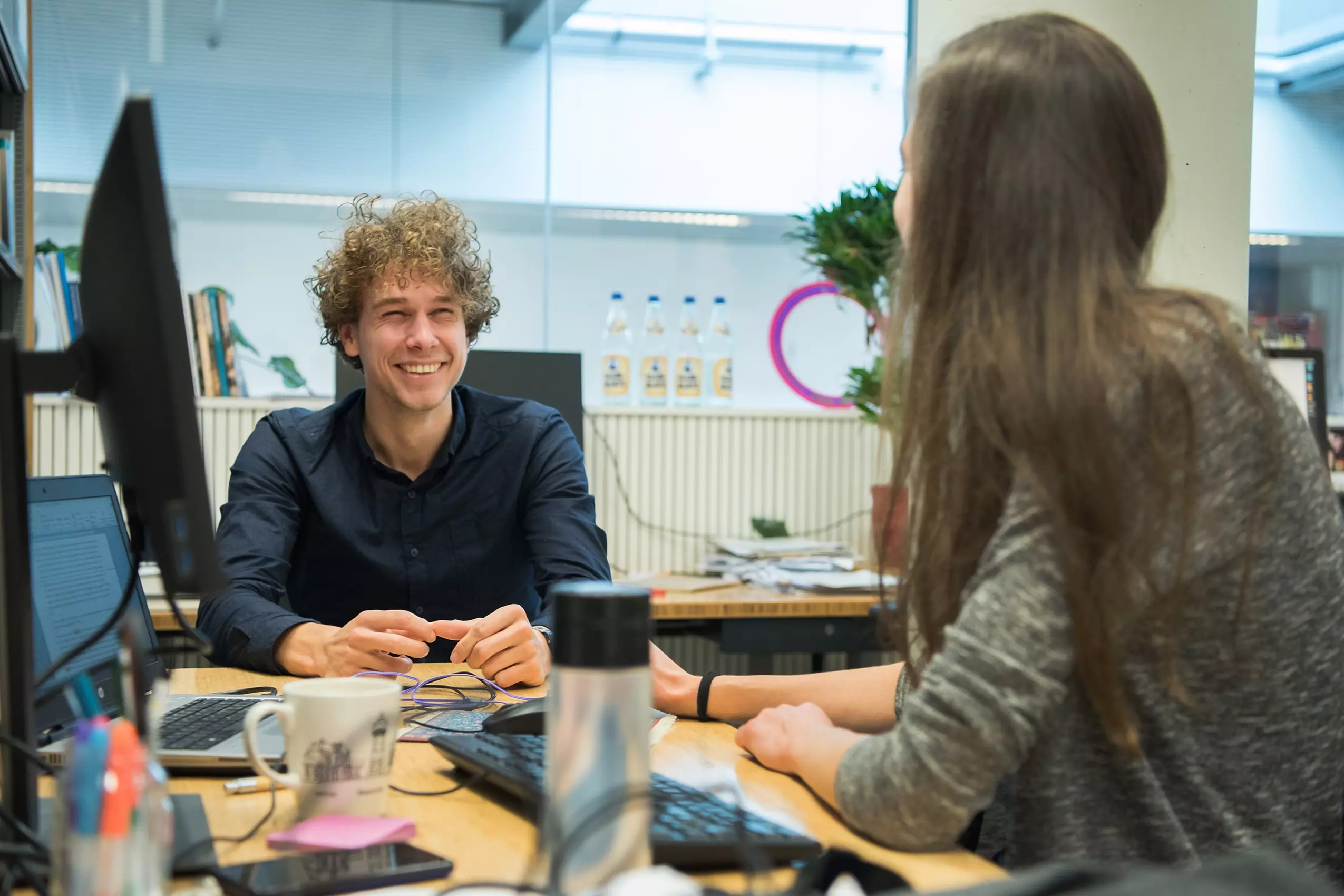
Are you a highly-motivated researcher looking for a post doc for performing state-of-the-art atomic physics experiments and developing quantum technology? Then we are looking for you.The hybrid atom-ion quantum systems lab, headed by Dr. Rene Gerritsma and Dr. Robert Spreeuw, is part of the Quantum Gases and Quantum Information (QGQI) cluster at the University of Amsterdam. The main focus of the group is to study the quantum dynamics in trapped ions while at the same time developing technology for emerging quantum applications, such as quantum computing and simulation.More information on our research can be found on the webpage (www.hyqs.nl).
PhD position Trapped Ions in Optical Tweezers
- Faculty of Science
- 14255
- Master's
- €3.059 - €3.881
- 38 hours
- Closes on24-08-2025

Are you a highly-motivated researcher looking for a post doc for performing state-of-the-art atomic physics experiments and developing quantum technology? Then we are looking for you.The hybrid atom-ion quantum systems lab, headed by Dr. Rene Gerritsma and Dr. Robert Spreeuw, is part of the Quantum Gases and Quantum Information (QGQI) cluster at the University of Amsterdam. The main focus of the group is to study the quantum dynamics in trapped ions while at the same time developing technology for emerging quantum applications, such as quantum computing and simulation.More information on our research can be found on the webpage (www.hyqs.nl).
PhD position Trapped Ions in Optical Tweezers
- Faculty of Science
- 14255
- Master's
- €3.059 - €3.881
- 38 hours
- Closes on24-08-2025
Working at the UvA
Join us!
This PhD position is part of the Gen-Q programme and applications must also be submitted through the Gen-Q website. Gen-Q has received funding from the European Union’s Horizon Europe research and innovation programme under the Marie Sklodowska-Curie grant agreement number 101217386.

Working at the UvA
Join us!
This PhD position is part of the Gen-Q programme and applications must also be submitted through the Gen-Q website. Gen-Q has received funding from the European Union’s Horizon Europe research and innovation programme under the Marie Sklodowska-Curie grant agreement number 101217386.
All about this vacancy
This is what you will do
We will develop a new platform for quantum computing, based on trapped ions in combination with optical tweezers. We will explore the use of tightly focused laser beams and their interaction with crystals of trapped ions to realize new ways to prepare and control qubits, making particular use of the so-called optical Magnus effect, an optical analogue of the well-known classical Magnus effect that is for instance applied in football, causing ball trajectories to curve. In trapped ions, this effect can be used to implement state-of-the-art quantum gates. The tweezers can also be used to sub-Doppler cool the ion crystal and for qubit readout. We will also explore the scalability of the scheme by designing ion traps based on integrated photonics for tweezer delivery.
What we ask of you
- at least 8 months of master project in experimental ultracold atom or trapped ion group;
- good team working skills;
- good English skills;
- strong letter of recommendation from master project supervisor;
For MSCA PhD positions it is required that the applicant shall at the date of recruitment be in the first four years (full-time equivalent research experience) of their research careers and have not been awarded a doctoral degree. The applicant must not have resided or carried out her/his main activity (e.g. work or studies) in the Netherlands for more than 12 months in the three years immediately prior the recruitment date.
This is what we offer you
A temporary contract for 38 hours per week for the duration of 4 years (the initial contract will be for a period of 18 months and after satisfactory evaluation it will be extended for a total duration of 4 years). The preferred starting date is 1 October 2025 or as soon as possible after that. This should lead to a dissertation (PhD thesis). We will draft an educational plan that includes attendance of courses and (international) meetings. We also expect you to assist in teaching undergraduates and master students.
All about this vacancy
This is what you will do
We will develop a new platform for quantum computing, based on trapped ions in combination with optical tweezers. We will explore the use of tightly focused laser beams and their interaction with crystals of trapped ions to realize new ways to prepare and control qubits, making particular use of the so-called optical Magnus effect, an optical analogue of the well-known classical Magnus effect that is for instance applied in football, causing ball trajectories to curve. In trapped ions, this effect can be used to implement state-of-the-art quantum gates. The tweezers can also be used to sub-Doppler cool the ion crystal and for qubit readout. We will also explore the scalability of the scheme by designing ion traps based on integrated photonics for tweezer delivery.
What we ask of you
- at least 8 months of master project in experimental ultracold atom or trapped ion group;
- good team working skills;
- good English skills;
- strong letter of recommendation from master project supervisor;
For MSCA PhD positions it is required that the applicant shall at the date of recruitment be in the first four years (full-time equivalent research experience) of their research careers and have not been awarded a doctoral degree. The applicant must not have resided or carried out her/his main activity (e.g. work or studies) in the Netherlands for more than 12 months in the three years immediately prior the recruitment date.
This is what we offer you
A temporary contract for 38 hours per week for the duration of 4 years (the initial contract will be for a period of 18 months and after satisfactory evaluation it will be extended for a total duration of 4 years). The preferred starting date is 1 October 2025 or as soon as possible after that. This should lead to a dissertation (PhD thesis). We will draft an educational plan that includes attendance of courses and (international) meetings. We also expect you to assist in teaching undergraduates and master students.
Your place at the UvA
You will work in this team
The Faculty of Science has a student body of around 8,000, as well as 1,800 members of staff working in education, research or support services. Researchers and students at the Faculty of Science are fascinated by every aspect of how the world works, be it elementary particles, the birth of the universe or the functioning of the brain.
The hybrid quantum systems group is headed by Rene Gerritsma and is part of the Quantum Gases & Quantum Information cluster at the Institute of Physics (IoP) of the University of Amsterdam (UvA). The main focus of the group is the use of trapped ions for quantum technology and quantum chemistry.
Want to know more about our organisation? Read more about working at the University of Amsterdam.
More about the UvA
The University of Amsterdam is ambitious, creative and committed. An inspiration to students since 1632, a vanguard player in international science and a partner in innovation.
The University of Amsterdam is the largest university in the Netherlands, with the broadest range of courses on offer. An intellectual hub with 42,000 students, 6,000 staff and 3,000 PhD students. Connected by a culture of curiosity.
Your place at the UvA
This is where you will be working
You will work in this team
The Faculty of Science has a student body of around 8,000, as well as 1,800 members of staff working in education, research or support services. Researchers and students at the Faculty of Science are fascinated by every aspect of how the world works, be it elementary particles, the birth of the universe or the functioning of the brain.
The hybrid quantum systems group is headed by Rene Gerritsma and is part of the Quantum Gases & Quantum Information cluster at the Institute of Physics (IoP) of the University of Amsterdam (UvA). The main focus of the group is the use of trapped ions for quantum technology and quantum chemistry.
Want to know more about our organisation? Read more about working at the University of Amsterdam.
More about the UvA
The University of Amsterdam is ambitious, creative and committed. An inspiration to students since 1632, a vanguard player in international science and a partner in innovation.
The University of Amsterdam is the largest university in the Netherlands, with the broadest range of courses on offer. An intellectual hub with 42,000 students, 6,000 staff and 3,000 PhD students. Connected by a culture of curiosity.
Important to know
Your application & contact
If you feel the profile fits you and you are interested in the job, we look forward to receiving your application. This call for applicants is placed by the Gen-Q network.
The application must be submitted through the Gen-Q website.
Follow the instructions there and “select Grand Challenge C “Developing quantum hardware” and topic 31C “Trapped ions in optical tweezers”. You must submit the same documents also via the button below. We accept applications until and including 31 August 2025.
A complete application must only consist of:
- Motivation letter
- CV
- Reference letter (cannot be provided by future potential supervisor)
- Ethics self-assessment
- Master's degree or any equivalent degree that enables to embark on a doctoral programme
All documents must be submitted as a single PDF file. Please put your family name in the file name. Please note that any extra non-requested documents will be disregarded. For further information regarding the motivation letter, see the guide for applicants. There is a template for the CV as well as a template for the ethics self-assessment. Please see the guidelines for more information on how to fill in the ethics self-assessment document. A knowledge security check can be part of the selection procedure (for details: national knowledge security guidelines).
If you have questions, please contact [email protected].
Diversity, Equity & Inclusion
As an employer, the UvA maintains an equal opportunities policy. We value diversity and are fully committed to being a place where everyone feels at home. We nurture inquisitive minds and perseverance and allow room for persistent questioning. With us, curiosity and creativity are the prevailing culture.
Important to know
Your application & contact
If you feel the profile fits you and you are interested in the job, we look forward to receiving your application. This call for applicants is placed by the Gen-Q network.
The application must be submitted through the Gen-Q website.
Follow the instructions there and “select Grand Challenge C “Developing quantum hardware” and topic 31C “Trapped ions in optical tweezers”. You must submit the same documents also via the button below. We accept applications until and including 31 August 2025.
A complete application must only consist of:
- Motivation letter
- CV
- Reference letter (cannot be provided by future potential supervisor)
- Ethics self-assessment
- Master's degree or any equivalent degree that enables to embark on a doctoral programme
All documents must be submitted as a single PDF file. Please put your family name in the file name. Please note that any extra non-requested documents will be disregarded. For further information regarding the motivation letter, see the guide for applicants. There is a template for the CV as well as a template for the ethics self-assessment. Please see the guidelines for more information on how to fill in the ethics self-assessment document. A knowledge security check can be part of the selection procedure (for details: national knowledge security guidelines).
If you have questions, please contact [email protected].
As an employer, the UvA maintains an equal opportunities policy. We value diversity and are fully committed to being a place where everyone feels at home. We nurture inquisitive minds and perseverance and allow room for persistent questioning. With us, curiosity and creativity are the prevailing culture.
Other interesting vacancies for you

PhD Position in Atom Interferometry
- Faculty of Science
- €3.059 - €3.881
- Closes on31-08-2025
- Master's
- 38 hours
Are you eager to push optical atomic clocks to new levels in a lively, international research group? Do you enjoy creating complex machines that have never existed before? Do you want to explore physics that nobody else has seen? Maybe you want to join our team as a PhD on our journey to continuous cold and ultracold atom interferometry. We are the QG&QI group at the University of Amsterdam and you can read more about the project here.
View vacancy

PhD Position for Advanced Nearest Neighbour Models for Active Matter
- Faculty of Science
- €3.059 - €3.881
- Closes on10-09-2025
- Master's
- 38 hours
Would you find it exciting to work on both theoretical and applied mathematics and experience how they can simultaneously advance each other? Would you enjoy working in an interdisciplinary research group? Would you like to work on a project that might resonate with multiple aspects of your background and interests? Do you find satisfaction in communicating mathematics well? Then we are looking for someone just like you to join our research project. We are a team of four mathematicians working on mathematical theory relevant to active matter, together with two scientists who work directly with active matter. We are seeking a highly motivated colleague to collaborate with us in develop new mathematical theory motivated by active matter applications.
View vacancy

PhD Position on Improving Social Media Using Large Language Models
- Faculty of Science
- €3.059 - €3.881
- Closes on06-09-2025
- Master's
- 38 hours
The Institute for Logic, Language and Computation (ILLC) at the University of Amsterdam is inviting applications for a fully funded PhD position in the NWO VIDI project "Improving Social Media Using Large Language Models."
View vacancy
Other interesting vacancies for you

PhD Position in Atom Interferometry
- Faculty of Science
- €3.059 - €3.881
- Closes on31-08-2025
- Master's
- 38 hours
Are you eager to push optical atomic clocks to new levels in a lively, international research group? Do you enjoy creating complex machines that have never existed before? Do you want to explore physics that nobody else has seen? Maybe you want to join our team as a PhD on our journey to continuous cold and ultracold atom interferometry. We are the QG&QI group at the University of Amsterdam and you can read more about the project here.
View vacancy

PhD Position for Advanced Nearest Neighbour Models for Active Matter
- Faculty of Science
- €3.059 - €3.881
- Closes on10-09-2025
- Master's
- 38 hours
Would you find it exciting to work on both theoretical and applied mathematics and experience how they can simultaneously advance each other? Would you enjoy working in an interdisciplinary research group? Would you like to work on a project that might resonate with multiple aspects of your background and interests? Do you find satisfaction in communicating mathematics well? Then we are looking for someone just like you to join our research project. We are a team of four mathematicians working on mathematical theory relevant to active matter, together with two scientists who work directly with active matter. We are seeking a highly motivated colleague to collaborate with us in develop new mathematical theory motivated by active matter applications.
View vacancy
.jpg)
PhD Position on Improving Social Media Using Large Language Models
- Faculty of Science
- €3.059 - €3.881
- Closes on06-09-2025
- Master's
- 38 hours
The Institute for Logic, Language and Computation (ILLC) at the University of Amsterdam is inviting applications for a fully funded PhD position in the NWO VIDI project "Improving Social Media Using Large Language Models."
View vacancy

Don't miss out on your dream job!
Sign up for a job alert and you'll receive automatic updates about new and relevant vacancies.

Don't miss out on your dream job!
Sign up for a job alert and you'll receive automatic updates about new and relevant vacancies.
This website uses cookies
We, and third parties, use cookies on our website. We use cookies to ensure that our website functions properly, to store your preferences, to gain insight into visitor behavior, but also for marketing and social media purposes (showing personalized advertisements). By clicking 'Accept', you agree to the use of all cookies. In our Cookie Statement. you can read more about the cookies we use and save or change your preferences. By clicking 'Refuse' you only agree to the use of functional cookies.
